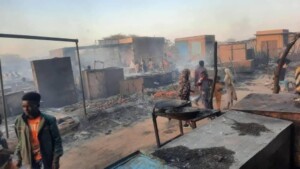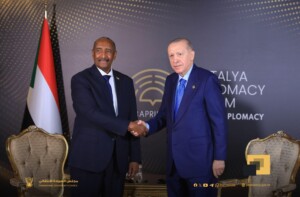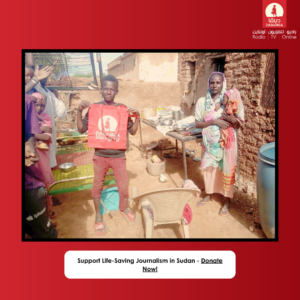‘Unified front highlights importance of media to Sudan society’

Sudanese Media: Four Months of Violations | Summary
Prominent voices from Sudanese media and human rights organisations have continued to respond to questions by Dabanga News regarding the joint statement on Monday by 17 Sudanese media institutions and press organisations, including Dabanga Radio TV Online, highlighting the critical state of press freedom in Sudan.
Journalist El Baqir Faisal, general coordinator of Journalists for Rights (Jahr), told Radio Dabanga the importance of the statement in terms of content and timing. “What distinguishes this statement is the leaders of 17 Sudanese press institutions presenting a unified front for the first time on the war, as well as issues of protection and safety of journalists, and freedom of the press and expression.
‘What distinguishes this statement is the leaders of 17 Sudanese press institutions presenting a unified front for the first time on the war’ – journalist El Baqir Faisal
He explained that the statement included important issues such as the right to access information, and access to areas witnessing armed conflict for press coverage, and the statement included many axes, including the humanitarian, professional and national aspects.
Regarding the timing of the release of the statement on August 15, Faisal told Radio Dabanga that the statement was issued four months after the outbreak of the war serves to monitor and document of what happened since April 15 “of a catastrophic war that destroyed the country and disrupted the interests of the people, and it also took stock of everything that has happened since that date”.
Sudanese Women’s Media Network
The founding member of the Sudanese Women’s Media Network, Sabah Adam, described the statement s as important in the process of monitoring violations.
The statement provided an excellent vision and sent messages to press institutions, regarding the journalistic handling of topics, and on the basis of abandoning hate speech, Adam explained.
‘GBV is one of the topics that are kept silent, especially harassment, rape, and physical violence, which is used as a weapon by both sides’ – Sabah Adam, Sudanese Women’s Media Network.
Adam stressed that the statement covered the issue of gender-based violence (GBV) against women journalists in conflict zones. “GBV is one of the topics that are kept silent, especially harassment, rape, and physical violence, which is used as a weapon by both sides.”
She added that the statement united the vision of the media, the need for freedom of expression, human rights, and the statement rejected the war, and that there should be accountability.
Human rights defender
Legal expert and human rights defender Saleh Mahmoud stressed the importance of the statement issued by 17 private press institutions in his call to stop the war and professional issues related to the press and journalists.
In an interview with Radio Dabanga, he endorsed the need to protect journalists and ensure freedom of movement for journalists to cover the course of the war in order to reflect the widespread and diverse violations.
He said that the efforts of journalists reflect the seriousness of the situation for the relevant international, minority, and UN bodies from a professional point of view.
Sudanese Journalists Syndicate
The head of the Sudanese Journalists Syndicate, Abdelmonim Abu Idris, told Dabanga Radio that the main driver of the statement is the deteriorating conditions in which journalists have been living, and the continuous violations and repeated attacks, whether on their homes or workplaces.
Abu Idris, pointed out that these violations opened a wide field for fake news and rumours due to the absence of truth guards, in addition to the arbitrary measures imposed by both sides of the war.











 and then
and then